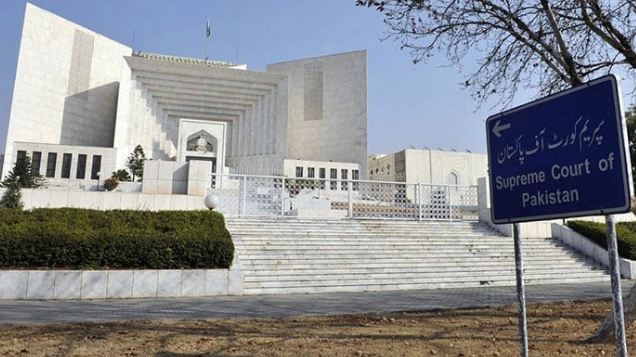ISLAMABAD, SEPT 6: The Supreme Court is set to announce its reserved verdict on intra-court appeals against the September 15, 2023 majority judgment striking down the amendments to the National Accountability Ordinance (NAO).
A larger bench headed by Chief Justice of Pakistan (CJP) Qazi Faiz Isa will announce the reserved judgment at 9:30am on Friday (today), as per the top court’s cause list issued today.
The CJP-led larger bench — comprising Justices Athar Minallah, Aminuddin Khan, Jamal Khan Mandokhail, and Hasan Azhar Rizvi — had reserved the verdict on June 6 on multiple appeals filed by the federal and provincial governments against the apex court’s September 15 verdict.
In the intra-party appeals, the top anti-graft body and the PTI founder were made respondents.
The majority judgment had struck down some amendments made to the National Accountability Ordinance (NAO), 1999.
The amendments — National Accountability (Second Amendment) Act 2022 —were passed in a joint sitting of the parliament in April 2022 during the PDM-led government which came into power after ousting ex-premier Imran Khan via a no-trust move in 2022.
It modified sections 2, 4, 5, 6, 25 and 26 of the NAB laws, however, 9 out of 10 amendments were declared “null and void” by the CJP Bandial-led bench on the PTI founder’s petition filed in June 2022.
Restoration of graft cases
In a 2-1 majority verdict announced in September last year, a three-member bench led by then CJP Bandial had approved Khan’s petition, challenging the NAB law amendments made during the tenure of the previous Pakistan Democratic Movement (PDM)-led government.
Alongside ex-CJP Bandial, the bench comprising Justice Mansoor Ali Shah and Justice Ijazul Ahsan had held more than 50 hearings on Imran’s petition.
Following the modifications in the anti-corruption watchdog laws, several graft cases against public office holders were closed down, however, the top court’s ruling restored all closed enquiries filed with the NAB.
The apex court ordered restoring all graft cases worth less than Rs500 million that were closed down against the political leaders belonging to different political parties and public office holders and declared the amendments void.
Furthermore, the court directed the NAB to return all records related to cases to relevant courts within seven days.
Larger bench formed after intra-court appeals
Subsequently, the federal government, filed an intra-court appeal against the SC September 15 judgment in October 2023, stating that the majority judgement suffers from procedural impropriety and is, therefore, liable to be set aside.
The apex court had constituted a five-member larger bench headed by CJP Isa on May 10, 2024, to hear the appeals and also granted permission to jailed ex-PM Imran to attend the hearings via video link to present his arguments.
After taking up the intra-court appeals, the Supreme Court in November last year barred the accountability courts from giving final verdicts in corruption cases that have been reopened after the nullification of the said NAB ordinance.
NAB amendments
Under the amendments, the NAB was restricted to investigate into any graft case worth less than Rs500 million besides curtailing the accountability body’s powers to probe into a fraud case unless its victims are more than 100.
It also modified the NAB law to keep an accused in its custody for a maximum of 14 days which was later exceeded to 30 days.
Moreover, the amendments barred the anti-corruption watchdog from taking action on federal, provincial or local tax-related matters.
Additionally, regulatory bodies operating in the country were removed from the NAB purview under the amendments besides transferring the pending interrogations, investigations, and trials against individuals or financial matters to relevant institutions and courts.
The changes to the law included reduction of four-year term of the NAB chairman and the bureau’s prosecutor general to three years. Moreover, it also set a three-year term for the judges of the accountability courts and that courts be bound to decide a case within one year.

















